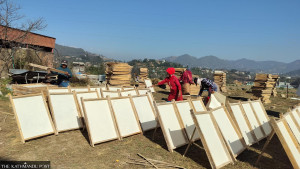Miscellaneous
Heavy suits
The successful conclusion of the NSU election was a litmus test for NC’s commitment to holding local, provincial and state elections by 2017
Sarin Ghimire
When Nepali Congress President Sher Bahadur Deuba walked to the podium to congratulate the newly elected Nepal Students’ Union’s central governing body during a function in the Capital on Thursday afternoon, his worn-out, exhausted posture spoke of the challenges he has had to weather this past month. Just prior to the event, he had settled the distribution of ministerial berths within his party.
The three-time prime minister had set himself a daunting task by pledging, as the newly elected president of the oldest democratic force in the country, in March, that he would conduct NSU polls within six months. Despite being well aware that the student wing had failed to hold elections since 2007 when his Nepali Congress (Democratic) reunited with the main party, then led by late Girija Prasad Koirala, Deuba on Thursday admitted that he was totally caught off guard when he made the pledge.
Mission enroute
Since the unification, neither Girija nor the erstwhile late party president Sushil Koirala was able to conduct polls of the sister organisation—considered the backbone of the Congress. And even though the general convention this month stretched for more than ten days, polls were conducted with overwhelming participation and minimal scuffles. Yes, it took quite a few days to settle the dispute regarding representatives from around a dozen districts. But, most importantly all misunderstandings were resolved with the consensus of the factions and power centres within the party. Deuba and his aides, who worked round the clock for the outcome, deserve their due credit. In fact, a majority of leaders speaking at Thursday’s programme, lauded the desire and sheer will power of those given the responsibility to hold the polls.
For a man who first became the prime minister almost two decades ago, Deuba commands far-reaching influence and has held his own as a major power broker in the political corridors. Among others, four notable members—Bimalendra Nidhi, Prakash Sharan Mahat, Bal Krishna Khand and Ramesh Lekhak—are said to have played significant roles in Deuba’s quest to run the party and the government. Nidhi, on the back of a strong family background within the party, is considered one of the party president’s strongest allies, particularly with a the party base in the Tarai region. Mahat, a US-educated intellectual, who rose through the ranks from the NSU, was one of the architects of the recent student wing polls. Khand, a former president of the party’s two sister organisations—NSU and the youth wing, Tarun Dal—has held his grip on a significant number of grassroots leaders. And Lekhak is seen as a strong figure in the western part of Nepal. All four have now been rewarded with ministerial berths. Nidhi leads the Congress in the government.
Stumbling block
Despite having an illustrious history and returning as the strongest party in Parliament in the last Constituent Assembly elections, the Nepali Congress remains vertically split between Deuba and the Koiralas (a faction now led by Ram Chandra Poudel) all the way from the grassroots to the topmost echelons.
When Girija rolled out the red carpet for Deuba’s return to the party in 2007, he set the tradition of distributing everything the NC had in a 60:40 ratio—with Girija as the party president claiming 60 percent and Deuba given a share of 40 percent. Ever since, the politics of factionalism has been deeply institutionalised within all wings of the party. NC, to this day, continues to run like two separate parties under the same roof.
Both Deuba and Poudel, during the party’s 13th general convention in March, insisted that the conclave would assert a message of unity and repeatedly claimed that politics of factionalism should be put to bed. However, the recent wrangling over ministerial berths in the government has once again laid bare the ground realities.
Poudel, who still hopes to lead the NC after the next general convention, was flexing his power by creating a furore while insisting on at least 40 percent stake on ministerial berths (five portfolios) for his loyalists.
Numbers don’t lie
Many leaders believe that Poudel, in reality, does not have the numerical base to imitate Deuba’s choice of structural ruling before the former prime minister became the party president. When Deuba lost the party’s parliamentary party election to Poudel back in 2009, he still managed about 44 percent of votes. The PP elections after the second CA elections in early 2014 had Deuba defeated again. He, regardless, had about 46 percent of parliamentarians vote for him. But when Poudel lost to Deuba in the polls earlier in the year, the former only managed to garner 32 percent of the votes. Numbers don’t lie. If Poudel is to wield significant influence over proceedings in the future, he will have to win over cadres en-masses not just his own supporters.
For now, the NSU polls legitimise NC’s determination to implement the constitution by holding three elections—local, provincial and state—before December 2017. The NSU election was the litmus test, the party now must move ahead in a unified manner if it is to play its role in the trials and tribulations that lie ahead




 16.12°C Kathmandu
16.12°C Kathmandu










